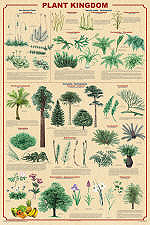|
|
| Life Science
Posters and Charts |
|
The Life
Science Revolution |
In 1735, Carolus
Linnaeus published the first edition of his Systema Naturae,
which set forth his system for classifying all living things. Over
the years it evolved into the familiar phyla, order, family species
organization. But Linnaeus only classified living species; he
was unaware of prehistoric life. Scientists now estimate that living
species account for less than one-tenth of one percent of all
animals that have every lived and that the Linnaeus system is the
“tail wagging the dog” as it fails to show the relationship between
living and prehistoric species. The Linnaeus system is now obsolete
as it has been replaced by the new cladistics classification system.
It uses phylogenetic systematics to reflect changes in physical
characteristics in an evolutionary tree-type organization. This new system is presented in being taught in all the
colleges, but is just now working it way into hgh schools and middle
schools.
We are proud to present a series of three cutting-edge
posters that are invaluable to the understanding of our how e look
at life on earth. The all-new Animal Kingdom 2 presents new
cladistic classification system. Animal Development and
Milestones of Vertebrate Evolution show and explain the
underlying information and organization.
Each of these three posters is self-contained and may
be used independently of the others, but they also complement one
another and are more effective when presented together. They provide
an invaluable, quickly accessible reference to educators, students,
professionals and others who are curious about the world in which we
live. |
|
|
|
These are actually two
overlapping sets. Animal Development, Milestones of Evolution
and Animal Kingdom comprise the first set. Animal Kingdom and
Plant Kingdom comprise the other. |
|
Plant Kingdom
The revolutionary changes in the way we look at animal life
have had little impact on the plant kingdom. Classification
has been comparatively stable. Linnaeus is still king. The
original purpose of this new edition of ther popular
Plant Kingdom poster was to match the graphic design of
Animal Kingdom 2, once again making them a matched
set. We took advantage of this opportunity to add the four
divisions of extinct plants resulting in a new poster.
Both posters are great for
life science classes but the nontechnical presentation makes
them popular with both animal and plant lovers.
|
 |
| |
Plant Kingdom |
|
|
The Vertebrates |
|
This four poster set provides a comprehensive overview
of the living vertebrates. Animal life is now undergoing
the transition from the Linnaeus classification system
to the new cladistic classification system. Birds have
been reclassified under the new system. There have been
many systems proposed for the other animals, but none
has been widely accepted. This required that the posters
present the animals in the context of their existing
orders. Each of these posters presents all of the orders
within the group. Marsupials and cartilaginous fish
contain so many orders that they are presented as super
orders.
Each order is introduced by the common
name or names (such as Whales, Dolphins and Porpoises),
followed by the biological name (Cetacea), the number of
species and a brief description. A great many
representational species are beautifully shown, all
identified by both common and biological name.
This is the first time that a comprehensive overview of this
enormous and complex subject has ever been presented on
posters. This set is invaluable for life science classes
and anywhere else that the study of animals takes place.
|
|
|
|
Other Titles |
| |
|
|
|
|
|
|
|
|
|
